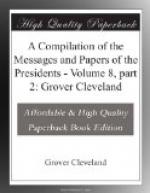INAUGURAL ADDRESS.
IN THE CITY OF PHILADELPHIA, PA
When it was first perceived, in early times, that no middle course for America remained between unlimited submission to a foreign legislature and a total independence of its claims, men of reflection were less apprehensive of danger from the formidable power of fleets and armies they must determine to resist than from those contests and dissensions which would certainly arise concerning the forms of government to be instituted over the whole and over the parts of this extensive country. Relying, however, on the purity of their intentions, the justice of their cause, and the integrity and intelligence of the people, under an overruling Providence which had so signally protected this country from the first, the representatives of this nation, then consisting of little more than half its present number, not only broke to pieces the chains which were forging and the rod of iron that was lifted up, but frankly cut asunder the ties which had bound them, and launched into an ocean of uncertainty.
The zeal and ardor of the people during the Revolutionary war, supplying the place of government, commanded a degree of order sufficient at least for the temporary preservation of society. The Confederation which was early felt to be necessary was prepared from the models of the Batavian and Helvetic confederacies, the only examples which remain with any detail and precision in history, and certainly the only ones which the people at large had ever considered. But reflecting on the striking difference in so many particulars between this country and those where a courier may go from the seat of government to the frontier in a single day, it was then certainly foreseen by some who assisted in Congress at the formation of it that it could not be durable.
Negligence of its regulations, inattention to its recommendations, if not disobedience to its authority, not only in individuals but in States, soon appeared with their melancholy consequences—universal languor, jealousies and rivalries of States, decline of navigation and commerce, discouragement of necessary manufactures, universal fall in the value of lands and their produce, contempt of public and private faith, loss of consideration and credit with foreign nations, and at length in discontents, animosities, combinations, partial conventions, and insurrection, threatening some great national calamity.




